When you speak to old timers about fishing for tigerfish on the Zambezi River they will tell you of driving along dirt roads, cutting a path through the forest to get access to the river. Lions still running wild, and while they fished elephants chased anglers away from the bank. This is not how it is today.
Tigers started as
a feline species of cats that occurred predominantly in Asia. Of which the Bengal, Siberian Sumatra tigers are probably the most well know feline tigers that we have, but they are endangered and we don't know for how long we will have them with us unless we take some serious action to protect them and their habitat.
Maybe because we have decimated the feline tigers, we have tried to recreate their beauty, grace, poise, elegance, strength and ferociousness by naming so many other things after them.
So what do we have now?
We have the Asian tigers
, the economic block made up of Singapore, Malaysia, and Thailand Indonesia. The Detroit Tigers, which is a baseball team. The Leicester Tigers who play Rugby. The Melbourne Tigers who are a basketball club. Tiger Woods who could be, arguably, the greatest golfer to have graced the greens. There were even some flying tigers in the form of the Tiger Moth airplane.
All these are famous tigers in some form or the other and there are probably more that have slipped my mind.
While all the other "tiger species" are proliferating, the feline species are shrinking.
The only other "tiger" that is an animal and has a stable population, compares to the feline species in grace, power, ferociousness, speed and awe inspiring beauty is the Tigerfish from Africa. So there is a tiger that is a fish [or is that a fish that is a tiger]?
Most fisher folk have heard of tigerfish: tigers should be on top or at least very high on their list of fish species to target...
When you speak
to the old timers about fishing for tigers on the Zambezi they will tell you stories of driving along dirt roads, cutting a path through the African riverine forest to get access to the river: Setting up camp on the banks of the rivers with lions still running wild. While they fished elephants chased them away from the bank as these huge mammals came down to river to drink, wash and splash around as only a herd of elephant can. If you were fishing from the bank you always required an extra set of eyes for the "African flat water dog" a.k.a. Crocodile. The tiger fish's scientific name also means water dog Hydrocynus vittatus (striped dog).
Fishing and camping trips to remote and distant areas in the 40's, 50's and 60's did not entail the modern luxuries of today's lodges or modern camping accessories that we have at our disposal today.
Transport was in the form
of old trucks, as 4 x 4's were only available to the military.
Refrigeration for the food and liquid refreshments was typically a huge block of ice that you purchased at the last town before you left "civilization". The African bush can get hot, very hot. 35 degrees in the shade is a pleasant temperature and you needed some form of refrigeration. At your campsite you would find a place that would have shade for the whole day: Dig a huge hole and line it with tarpaulin, dump the ice block in there and that was your refrigerator that kept your supplies, liquid and solids cold for the next couple of days. Fishing in the old days was normally with spoons (literally pieces of table spoon sometimes) or a fillet of bait fish. Sometimes if the fish came up to the spoons, had a look and disappeared you would tie a fillet on the spoon to convince him to take the spoon. One of the favorite commercially available spoons was the red and silver, Zambezi aristocrat.
Those were the days when noise pollution was the Trumpeting of a herd of elephant the ear piercing non stop (cry, scream) of the cicadas. 40 different birds singing, chirping and chattering you awake, while you are trying to sleep off last night's evidence of sitting next to the fire and reminiscing of the day's fishing while consuming some amber liquid (beer, whiskey or brandy).
|
|
|
|
|
|
|
|
|
|
"Water pollution"
was mainly resultant from the Hippo's that did their business in the river. Air pollution was the flock of water birds flying past and blocking the sun's rays for a brief while and the smoke of your fire you made to brew some coffee or braaiing the meat (in southern Africa you don't barbecue, you braai) and to keep you company at night and keep the more toothy animals away. Fortunately this is still available in the areas where tigerfish occur. The only difference is that at some of the spots you can now stay in five star safari lodges, luxury camps or if you wish, still camp in your rooftop tent mounted on the 4 x 4.
The tigerfish
, in Africa south of the Equator, occur as far south as the Tropic of Capricorn.
The river systems that play host to tigerfish include the Zambezi and Katanga Deltas. The only exception where it occurs south of the Capricorn is the Phongola system, near the border between South Africa and Mozambique.
Tigerfish occur from the Eastern borders of South Africa and central southern Africa (Zimbabwe, Zambia, Botswana) but is absent in the west flowing Kunene River, which forms the border between the Angola and Namibia.
The Okavango delta is situated in the northern area of Botswana and is one of earth's last unspoilt wilderness areas.
It is one
of earth's largest inland waters systems. The water from the Delta comes from the Angola highlands. This is almost a misnomer as this highland is only about 60m higher that the Delta itself.
The rain in the Angolan highlands starts round about October and ends sometime in April. This water drains inland.
The water travels 450 kilometers or some 300 miles south and southeast, over this distance it drops only by 60 meters as mentioned earlier. This slowly meandering pace takes up to 9 months to complete. The floodwaters, as is common for most processes in Africa, are in no rush and each second is treasured as it passes through this lovely scenery. Here the water's only driving force and eternal fuel, gravity, carries it on until it eventually disappears in the sand of the Kalahari desert or evaporates from the African sun.
Generally there is not a huge amount of flood damage, as the water moves so slowly.
When the water level reaches its peak a total area of 16000 kilometers square can be flooded. The smallest area covered at the end of the dry season is about 9000 kilometers square. The water level slowly rises and floods out of the main channel and onto the floodplains. The small baitfish migrate to the safety of these floodplains and this is where they breed.
|
|
|
|
|
|
|
|
|
The Okavango
is a maze of waterways and some of the islands are huge patches of floating papyrus.
With the foraging of the hippos and the odd fire, new canals are continually created: as the floating islands drift the pathways in the Delta shift.
The local guides at the camps who grew up in this maize know their way through these shifting canals like you do the path between your front door and beer fridge.
At the edges of the Delta you will find the communal land and it is not strange to see goats and cows feeding on the edges of this giant wilderness area.
Deeper in the Delta it is Africa at its purest and best. Wild animals abound and on your travels along the waterways it is not uncommon to spot numerous species of antelope, elephants, crocodiles hippos and even a pride of lions or two who make these islands part of there home territory.
For the Birders this is about as close to Nirvana as it gets without having to die, over 350 different species have been spotted in the delta.
Tiger fish all over have the same habits where like sized fish roam together in schools. The really large fish are loners.
The main fishing time
for Tigers in the Delta area and all the rivers feeding the Delta is the annual "barbel run". The "barbel" is an African Catfish (Clarias Gariepinus).
You don't fish for the Barbel. As the floodwaters slowly recede and the huge floodplains are being exposed the baitfish migrate back to the main channel.
The barbel start to hunt in packs and start to herd the small fish who try to take refuge in the papyrus and reeds. Baitfish can be little sprat like fish from as little as 3cm long to Churchill's up to 20cm in length. The escaping baitfish that are so lucky not to fall prey to the marauding barbel are snapped up by the Tigerfish who follow the feeding frenzy. During very large barbel runs you can catch Tigers on poppers and surface bugs.
Depending on the amount of water that flooded the Delta the prime time to fish the Barbel run is October. John Yelland from Upstream who runs annual trips to the Delta to fish the Barbel Run, recommends the following tackle, for fishing in the Delta area , a 6 to 8 weight rod with a fast sinking line (8 being the preferred choice). Your leader varies between 4 and 7 foot depending on the water depth, which is between 1 and 2 meters deep.
For many a fly fisher
the fly of choice is a Clouser Minnow. Should you miss the barbel run, you should fish the inside bends of the river or close to the papyrus and reed beds. This is where the Tiger fish congreagate and wait for passing baitfish. Fishing in the delta is best done from boats as you would share the water with crocodiles and hippos if you attempted to wade (and banks are typically densely covered with reeds). In Africa, hippos kill more people than any other wild animal. Other fish that are available are various species of bream and the flies to use for them will be Zonker and Bunny patterns, large buggers, deer hair bugs and poppers and smaller streamer patterns.
Accommodation in the Delta varies, from super luxury to absolute 4 x 4 almost survivor mode.
The Delta is fed by feeder rivers and John Yelland uses the Lodge that is situated on the banks of the Nxamaseri River is a lodge.
Here you can stand on the terrace of the lodge, with the river flowing at your feet, cast a fly and hook a tigerfish.
Korrie Broos
Elephants crossing the Zambezi river start out looking like rocks, but turn into live animals
Flycastaway />
Have you ever
wondered what it would be like to fish in the movie "Jungle book" or "The Lion King" well come and fish for tigerfish and you will know. Your spectators can be hippos in the river, elephants, baboons, guinea fowl, fish eagles, antelope, and zebras along the banks of the river. One of the best places to fish for tigers in fast flowing rivers is the Zambezi river Valley.
These areas are still wild, unspoilt areas. Where lion, elephant, crocodiles, hippos, antelope and many other wild animals still roam free.
Again the best time of the year to fish is September and October when the water has warmed up and the level has dropped. Tigerfish prefer warm well oxygennated waters. The lower the level of the river, the more structure is exposed and the more concentrated the fish become. To reach these remote areas you will need a serious 4 x 4 or a light aircraft.
There is a camp
on the banks of the Zambezi River, Kulefu Tented Camp. Here you can experience the "Lion King" and "Jungle Book" setting while fishing for Tigerfish.
This tented camp on the banks of the river boasts all the modern civilized comforts and world-class game viewing and fishing from virtually the terrace of the tented camp.
Gerard Laubscher and Arno Matthee of FlyCastaway guiding services, who run tiger fishing expeditions from Kulefu, recommend the following fishing setups for fishing in the Lion King settings.
A 9-foot, 9 weight rod with fast sinking lines suitable for warm water. Fast sinking tips are not recommended, as the water is strong fast flowing water. With the fused lines and different densities it becomes very difficult to maintain direct contact with the fly.
Tigerfish with their
hard and bony mouths make hookups very difficult: The different densities of the fused lines and the bellies that form in the strong flowing waters makes the setting of the hook even more difficult. Frustration will be the name of the game with many a lost fish. Leader setups are generally short on the fast sinking lines with the maximum being about 5 foot, 4 foot is even better. A straight mono of 12 to 15 lbs is all that you need. In slower flowing waters there are many fly fishers who fish with a straight mono leader setup. But for the faster water piano wire is a must. A 5 inch 50 lb section between the leader and the fly is the recommended medicine. You can go thinner as the fish won't bite it off but the thicker wire is less likely to kink and is easier to straighten when it does kink. The darker the wire the better as the tigerfish sometimes attack the more shiny varieties and you could end up with an empty piece of mono after such an attack.
Suitable flies such as buck tail streamers in combinations of black, grey, red, orange and yellow work well and are quick to tie. Make sure you have some weighted and unweighted flies with some Clouser Minnows as well.
Short shank
straight point hooks are recommended by all guides in Southern Africa for tigerfish.
As all your spectators could be star performers in the Lion King and Jungle Book no wading is allowed and all fishing is from boats.
Some of the other fishes you can catch in the Zambezi are nembwe, chessa and yellowfish (see article about yellowfish)
All the fishing for tigerfish is at the end of the dry season and towards the start of the rainy season.
You might be lucky to experience one of the early thunderstorms.
|
|
Rain in Africa
outside the tropical rain forests is something truly spectacular and the words for the monde green for TOTO's song "Africa" of " I bless the rain's in Africa" could be very appropriate "I miss the rain's in Africa". If you experienced one thunderstorm on the Africa savannah, you will always long to have another and you will forever "miss the rain in Africa." Africa in general is a dry continent, the rain in Africa is very special it builds up over a period of days, nature waits, almost impatient, the animals are restless, almost nervous as they wait for the rain. The dry dust has a unique smell, a dry earthy smell. Dry grass waiting for the first rains to fall, budding leaves are a gray green color waiting for the first rains to fall to turn a bright fresh green. The animals wait for the dry seasons to come to an end too. Cicadas screaming monotonously until your ears have this constant ring in them and you won't notice that the cicadas have stopped. Dark at the bottom and brilliant white at the top from the reflecting sun, the clouds build up. Huge Cumulonimbus anvil shaped clouds. They start early in the day and then disappear late in the afternoon. The next day the routine is the same. Sometimes this routine repeats for days and then disappears totally, ushering in another dry year: But if the Rain Gods decide to bless Africa you will feel how the huge drops of water hang in the air, the smell of rain approaching will fill your nostrils and you will see the heavens waiting for the command to unleash the water on to the earth. Nature as a whole becomes silent as they wait for the rain to fall. It is amazing how many times a huge thunderbolt is the cracking whip that commands the heavens to open up and unleash the huge drops of rain.
Amazing sounds that will stay with you as you wait for the first drop to land. The the first one lands in the dust with this heavy muffled solid thump, then a next and next until it is a curtain of water landing in water. Pretty soon you will see that the African soil is grateful, very grateful when it comes to water. Turning lush green almost overnight.
If you are fishing
outside the drier times of the year it will be preferable to fish the man made lakes.
Where the tigers in many of the rivers are stronger pound for pound because they are constanly fighting the current, the tiger fish in the dams make up for it in sheer size.
Being the one of the fastest if not the fastest fresh water species, very few fish can out sprint the tiger fish when it is in feeding mode. Very seldom will it need to operate at full throttle to catch a prey. The only time it will be full throttle is when you have a hook-up.
Being the one of the fastest
if not the fastest fresh water species, very few fish can out sprint the tiger fish when it is in feeding mode. Very seldom will it need to operate at full throttle to catch a prey. The only time it will be full throttle is when you have a hook-up.
Most fly fishers on their first take and hook-up, thinks that they have stuck a rock on the bottom,especially with the fast sinking lines. When the fish turns and takes off into the blue yonder, you will forever remember that jet proppelled moving rock. Wrapped knuckles, burnt palms and absolute disbelief will be the lingering memories.
Fishing in dams are also from boats as the fish tend to move around, hunting for prey.
There are various dams
that have tigerfish in them. Lake Kariba in Zimbabwe, Cabora Basa in Mosambique and Pongola Dam in South Africa are but a few. On many of the dams you can rent house boats, and virtually fish from the stern or the "verandah" of the boat. Or you can take the tender boats and go and search for the Tigerfish. Alternatively many of the dams will have accomodation on the shore. Pongola dam is the only dam that is in a very low risk area when it comes to malaria. This is also the most southern area where tigers occur. This dam is the only dam that is completely surrounded by a game reserve and is one of the oldest game reserve in South Africa. The reserve extends over part of the original area that, in 1894, was declared the Pongola Game Reserve by Paul Kruger, President of the old Transvaal Republic. The original reserve has since been re-proclaimed, in part, as the Phongolo Nature Reserve, which is the present Pongola Game Reserve's immediate neighbour.
|
|
|
|
|
|
For the fly fisher
that wants a true African experience to enjoy with his family. With safari's, game drives, good cuisine and fly fish for tigerfish. This is the place to go to.
Although tigerfish occur
in some of the other national game parks, you are not allowed to fish in the national parks in South Africa. Here you can fish for these magnificent fish and experience an African safari with all the bells and whistles of a modern safari holiday. Karel Landman the owner of Pongola Game Reserve recommends a 8 or 9 weight rod with a fast sinking line and an intermediate line for fishing this huge impoundment, when the Tiger fish is feeding closer to the surface. As with all huge pieces of water the wind can blow strong at times and then the 9 weight works well. The hook sizes here are also large,3/0 and larger. The most popular flies are Clousers, Zonkers, Deceivers. Favourite colors are Pink, Blue, White, Brown and Black.
Here a day's excitement could include landing a huge tiger fish, a game drive where you spot elephants, rhinos, antelope, buffalo, lounging next to the pool and doing absolutley nothing to recharge the batteries and end the day with a five star meal.
The added advantage
of fishing Pongola Game reserve is that the mecca of South African Deep sea fishing in the warm Indian ocean is less than an hours drive away at Sodwana Bay.
Here you can cast a line to gaint GT's or tease a sailfish to take your fly, maybe even a marlin.
Facts
For more info about fishing for tigerfish and guided tours you can visit the following websites
Upstream Flyfishing - www.upstreamflyfishing.co.za/
FlyCastaway - www.flycastaway.com
Pongola Game Reserve - www.pongolagamereserve.com
Korrie Broos
- Log in to post comments

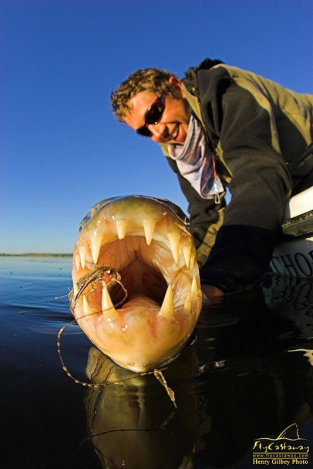
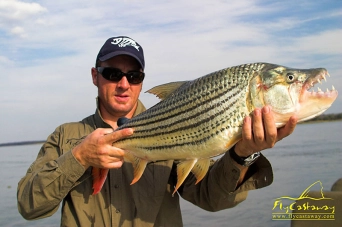
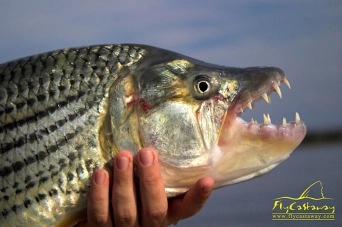
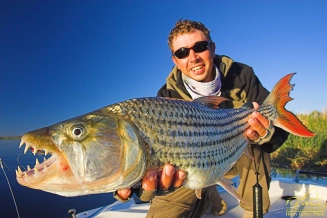
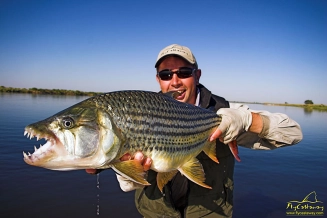
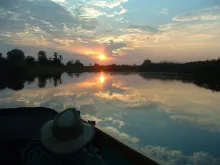
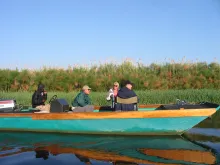
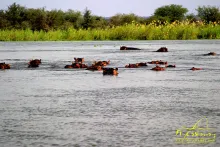
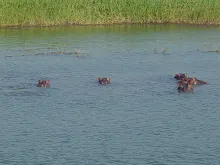
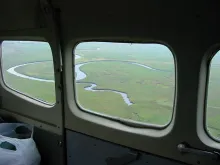
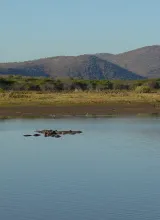
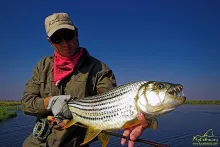
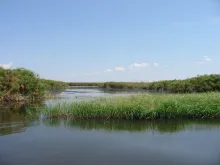
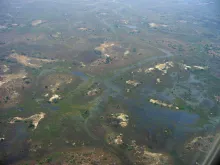
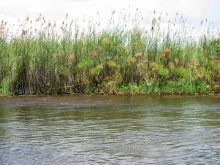
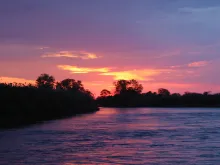
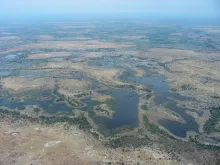
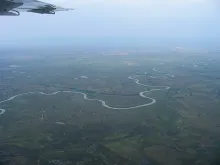
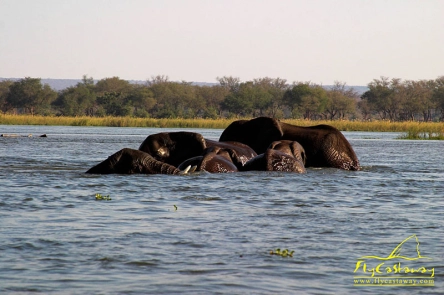
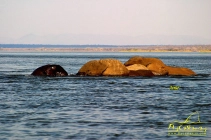
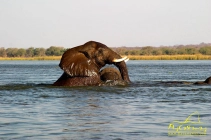
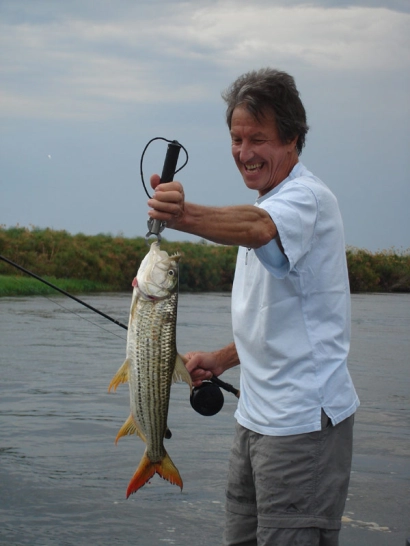
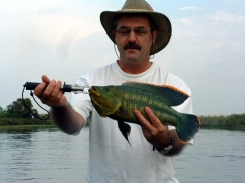
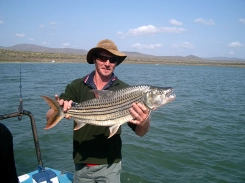
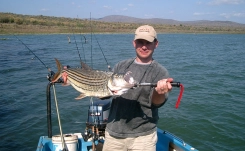
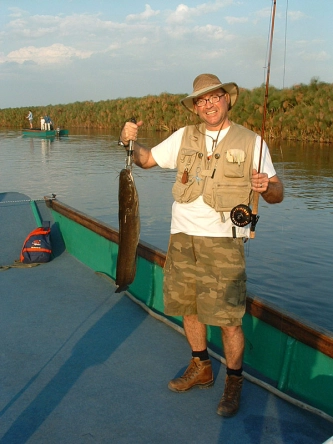
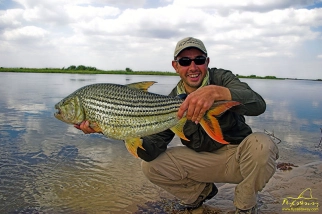
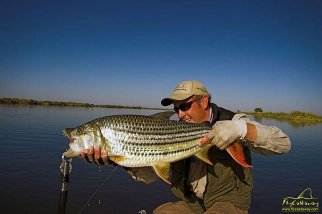
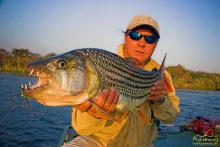
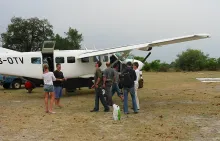
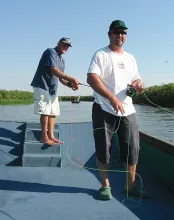
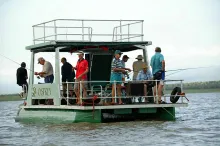
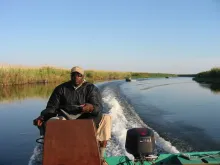
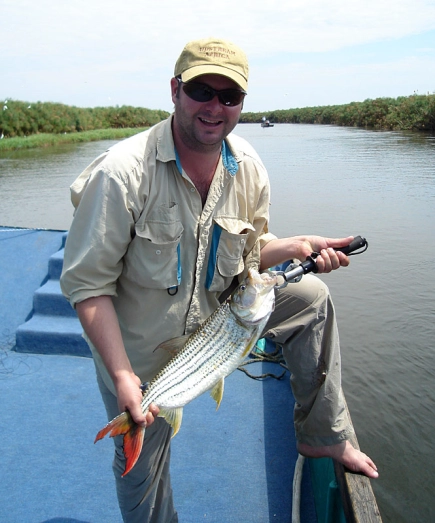
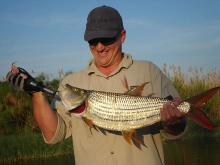
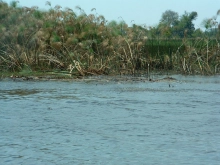
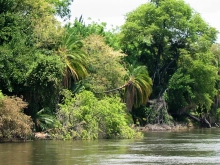
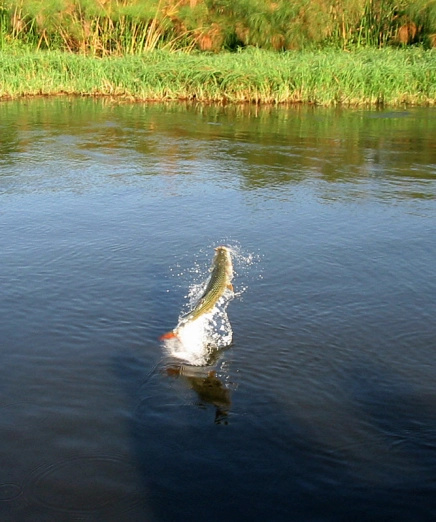
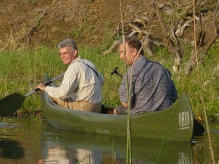
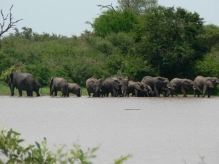
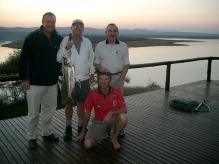
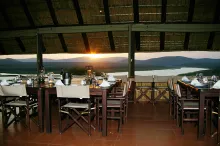
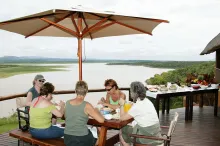
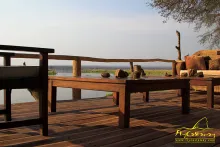

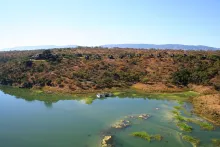
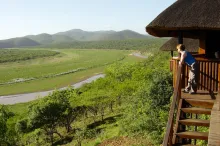

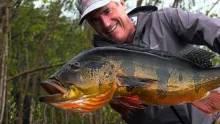

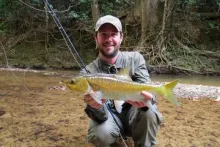

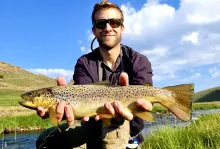

I am one of the peop
I am one of the people who fished these areas including Kariba in the sixties, seventies and up to eighty nine, before during and after the Independance Fiasco, you can keep modern Zimbabwe. Our wives also fished during the time we were out there, we had the use of a fishing camp which belonged to good friends, we also had home made coolers and generators. Crocs Hippos and Elephants all good fun and part of the attraction. Boats we had also and the best airline in the world who brought them in free of charge. All our friends moved down to South Africa in the nineties. My family and I came back to the UK, and settled here after thirty years of traveling in foreign parts. NB: We swapped Zimbabwe for Canada and the US spending six weeks a year in one or the other fishing the fly with good buddies who moved there some years ago. We got more memories than you can shake a stick at.
Cool tiger fishes!!!
Cool tiger fishes!!!
someday man......som
someday man......someday!
Man am I homesick. I
Man am I homesick. I remember the days when we used to tiger fish each year without fail. Hot sun, warm drinks, plenty of action on the water, tight lines guys.
I fished the Delta,
I fished the Delta, Zambesi and Kafue river systems from 1950 onwards until the late 70's. Thank you for bringing back many happy memories. In the early days, Bots really was paradise on earth. In my humble opinion, the Kariba tiger are not worth much. Fight like a sack of coal next to the river tiger. The King tiger from the Congo river around Elizabethville and Katanga were awesome.
I am looking for the
I am looking for the Tiger Fish where the cells in the fishes eye heals it self.Also being used to
try on Diabetes patients for there eyes.
To Michael Nielsen -
To Michael Nielsen - mail me at - johnyelland@eject.co.za - and I will give you all the details of our Okavango Tigerfishing trips including activities for non-fisher people! This year we ran two back-to-back flyfishing trips and caught huge fish - a total of eleven fish of over 10lbs - and lots of fish - very exciting stuff! Best wishes - John Yelland - Upstream Flyfishing - Cape Town - South Africa.
This looks truly ama
This looks truly amazing, I would love to go.
I also ask for a pricelist, maybe a whole trip planned.
Plane from Denmark, taxi/bus, Cabin/hotel, Fishingtrip and oppertunities for the girlfriend, while im fishing. ect. for a week maybe? I hope someone can help me.
Only the ears of the
Only the ears of the hippo- is the southern African version of "the tip of the iceberg"
A bit of local useless information that I forgot to use in the original text.
Every time I use the idiom in a conversation with people not from southern Africa, they look puzzled.
Have a look at the hippo photos.
Thought I would mention it, in case you come across the expression and you did not know what it means.
What a terrific, ins
What a terrific, insightful article and pictures!! The Tigerfish is truly amazing - all those teeth. Thanks.
WOW!!! Thats alot of
WOW!!! Thats alot of Teeth in one fish!! Thanks for the heads up mate really aprreciate it!
Johan,
Follow the
Johan,
Follow the links in the fact box above these comments and ask the outfitters Upstream Flyfishing and FlyCastaway directly.
Martin
Hi could you please
Hi could you please send us price list in (euro's) for one week fishing and staying at the camp for 2 people.
Regards
Johan
Thanks for the origi
Thanks for the original and insightful article.....good stuff.
Thanks to Graham Ave
Thanks to Graham Avery for highlighting this point. The Namibian Goverment is planning to build a hydro electric dam at the Popa Falls.(about 50 km from the Botswana border). This will deprive the delta of its single most important aspect- flooding. Searching on Google for "damming of the okavango" you will find a couple of articles about this highly controversial Dam and the total affects on tourism, ecology, economics and the FISHING.
The "damage" caused
The "damage" caused by seasonal inundation and drying of the Okavango Delta and other areas of this system is, however, ecologically essential for it's ongoing health, and ability to provide food and security for a wide range of aquatic and terrestrial animals, including fish. Any human intervention that undermines this delicate balance (like damming) will almost certainly lead to irrecoverable natural and economic damage to parts of the region, including to the natural fisheries Broos has written of so inspiringly
WOW, great photos :)
WOW, great photos :)
Fantastic pictures a
Fantastic pictures and a great read!
The Broos has done i
The Broos has done it again... This has made for yet another great artical, gripping stuff nice pictures. I cant wait to strike at those Tigers
Woow! Very nice fish
Woow! Very nice fishing. Fantastic and mystery. Great article. Thanx
Spectacular!
Truly
Spectacular!
Truly enlightened over another article with a difference set in a destination with a difference.
A wonderful article Korrie complimented with dreamy pictures of wild truth and beauty.
Ripley
Tigers, Lake Kariba and the Zambezi Aristocrat
I was one of the privileged few that grew up in Rhodesia and spent my teen years catching tigers in Lake Kariba. The Zambezi Aristocrat was definitely the lure of choice. I'll be up in eastern Caprivi in two months time, using the same rod and Penn reel I used in my childhood, and will again enjoy casting into the Zambezi. Wish me luck :-)